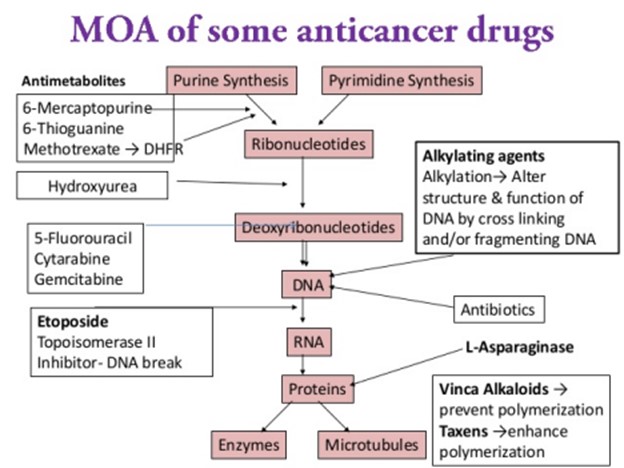A 58-year-old man is going to have chemotherapy for lung cancer. He asks the nurse how the chemotherapeutic drugs will work.The most accurate explanation the nurse can give is which of the following?
"The molecular structure of the DNA is altered."
"Cancer cells are susceptible to drug toxins."
"Chemotherapy encourages cancer cells to divide."
"Chemotherapy affects all rapidly dividing cells."
The Correct Answer is D
Chemotherapy is a treatment modality used to target and destroy rapidly dividing cells, including cancer cells. It works by interfering with the cell division process, which is a characteristic of cancer cells. However, it is important to note that chemotherapy drugs can also affect normal, healthy cells in the body that undergo rapid division, such as cells in the bone marrow, hair follicles, and gastrointestinal lining. This is why chemotherapy can be associated with side effects like bone marrow suppression, hair loss, and gastrointestinal disturbances. While the molecular structure of DNA can be altered by certain chemotherapeutic drugs, this explanation is not comprehensive enough to encompass the overall mechanism of action of chemotherapy.
The statement that "cancer cells are susceptible to drug toxins" is partially true, as cancer cells are generally more vulnerable to the cytotoxic effects of chemotherapy drugs compared to normal cells.
Chemotherapy aims to disrupt the division and growth of cancer cells rather than promoting their division.

Nursing Test Bank
Naxlex Comprehensive Predictor Exams
Related Questions
Correct Answer is B
Explanation
Pain tolerance refers to the maximum level of pain that an individual can tolerate without significant distress. It is influenced by various factors, including psychological and emotional factors. While emotions such as anger, boredom, and introversion can have an impact on a person's pain perception and experience, sleep plays a significant role in pain tolerance. During sleep, the body is in a state of rest and relaxation, allowing for decreased sensory input and potentially reducing pain perception. Sleep provides an opportunity for the body to repair and heal, which can contribute to improved pain tolerance. Additionally, sleep promotes the release of endogenous opioids, which are natural pain-relieving substances produced by the body.
Correct Answer is B
Explanation
Gentamicin is an antibiotic that is usually administered via IV infusion. The peak level is the highest concentration of the medication in the bloodstream, and it is important to monitor it to ensure therapeutic levels are achieved without reaching toxic levels.
Drawing the peak level 30 minutes after the infusion is complete allows enough time for the medication to distribute throughout the body and reach its peak concentration. This timing provides an accurate representation of the highest drug concentration in the bloodstream. 30 minutes before starting the infusion: Drawing the peak level before starting the infusion would not accurately reflect the peak concentration of the medication in the bloodstream. Immediately before the next dose of Gentamicin: Drawing the peak level immediately before the next dose would not provide an accurate assessment of the highest drug concentration, as the levels would have started to decrease due to elimination.
1 hour after infusion is complete: Waiting for 1 hour after the infusion is complete may result in missing the actual peak concentration of the medication in the bloodstream, as it may have already started to decline.
Whether you are a student looking to ace your exams or a practicing nurse seeking to enhance your expertise , our nursing education contents will empower you with the confidence and competence to make a difference in the lives of patients and become a respected leader in the healthcare field.
Visit Naxlex, invest in your future and unlock endless possibilities with our unparalleled nursing education contents today
Report Wrong Answer on the Current Question
Do you disagree with the answer? If yes, what is your expected answer? Explain.
Kindly be descriptive with the issue you are facing.
